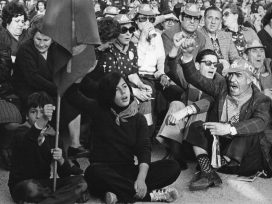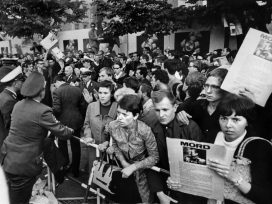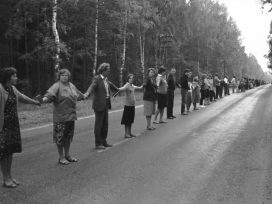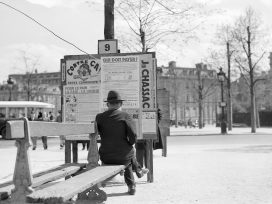When, forty years on, the memorable moments of the Prague Spring and the Paris Spring – not forgetting Berlin and Warsaw – are recalled in conferences, debates and publications, there emerges a striking contrast between East and West, to borrow the terminology of those times. In Paris, in commemorations of the May 1968 “psychodrama” (Stanley Hoffmann), the self-congratulation of one generation tends to get mixed up with the desire on the part of the next to claim for itself the legacy of those days in May. They are all the more keen to do so because it has been denounced by a new French president who was ironically described by Daniel Cohn-Bendit as an unwitting soixante-huitard – all Sarkozy is said to have retained of those heady days of May ’68 is the celebrated watchword: “enjoy without restraint” (jouir sans entrave). In Prague, meanwhile, people are less inclined to commemorate what was a painful defeat. While Alexander Dubcek was, admittedly, an inspiring figure, he was also a symbol both of shattered hopes and of a surrender that was to herald twenty years of “normalisation”.
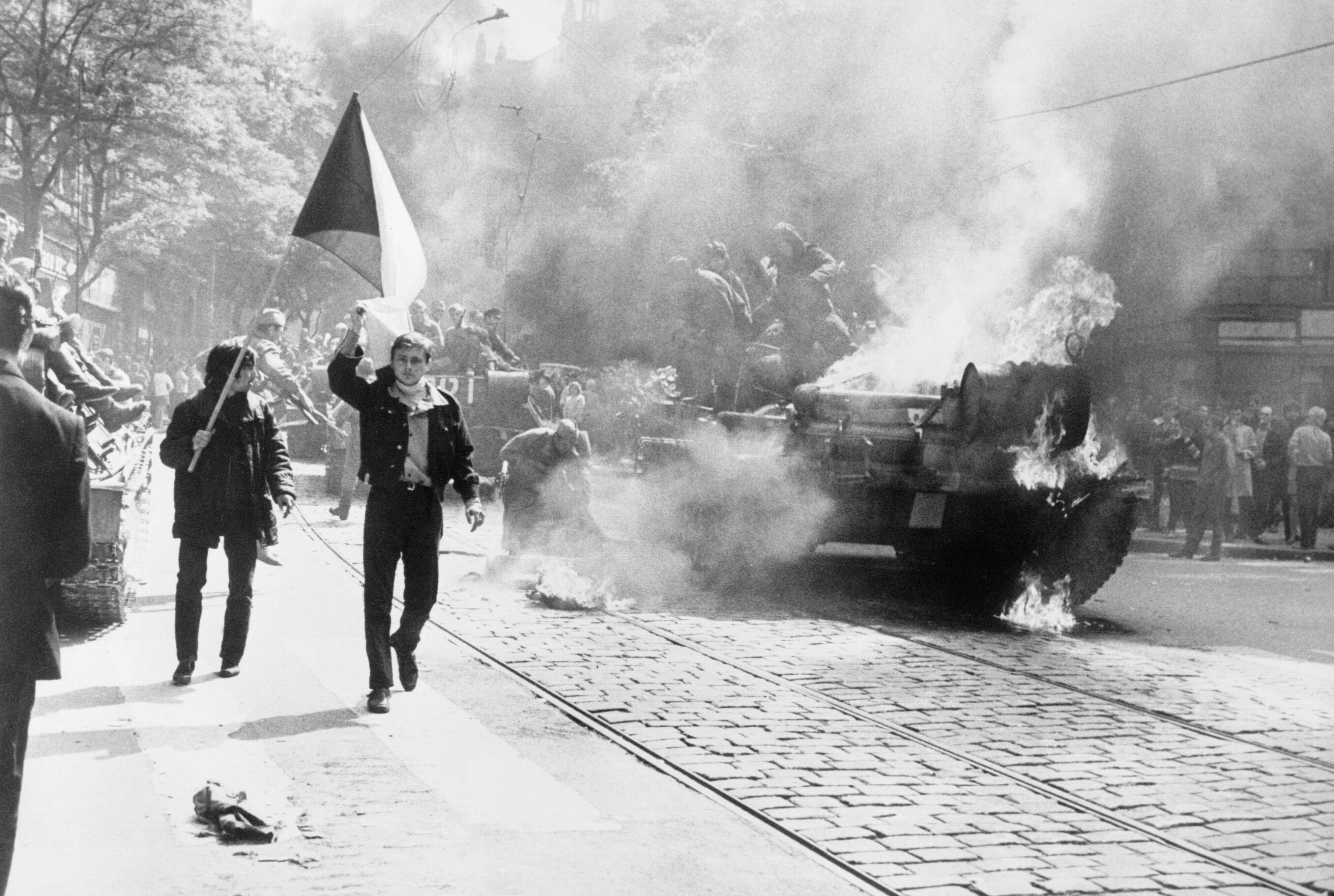
During the Soviet invasion of Czechoslovakia, Czechoslovaks carry their national flag past a burning tank in Prague. Source: The Central Intelligence Agency/Wikimedia
Nevertheless, after years spent in the shadows, banished from the collective memory, discussion of 1968 has made its reappearance in Prague with this year’s republication in Literarni Noviny of two key texts written immediately after the occupation by the “fraternal countries”. One is by Milan Kundera and the other by Vaclav Havel. In essence, the former was saying: despite having been a defeat, the Prague Spring retains its universal significance as a first attempt at finding a route between the eastern and western models, a way of reconciling socialism and democracy. Havel replied that the great gains made by the Prague Spring (abolition of censorship, re-establishment of individual and collective freedoms) had done no more than restore what had existed thirty years earlier in Czechoslovakia and what was still fundamental in most democratic countries. Seen in that way, 1989 was an anti-1968: not a reform of socialism but the closest possible adherence to the West, faithfully following its lead. Twenty years after the Velvet Revolution, in the context of economic globalisation and of a premature crisis in democratic representation, questions about democracy, the market and the “third way” raised by the Prague Spring of 1968 may once again be seen as apposite.
From this perspective, the Prague Spring goes beyond the history of the Communist system in eastern Europe and takes on a pan-European dimension. This dimension was at times associated with the revolt by young people that occurred sporadically throughout 1968 all over the world. The Prague Spring, along with May ’68, was seen as the expression of uprisings which, albeit in differing political contexts, challenged the status quo that had been imposed by the Cold War and sought for alternative kinds of society.
The parallels were, for the most part, a result of the simultaneity of the “events” of 1968. The fact that their driving forces were the intellectuals and a generation of students who, from Prague to Paris (but also in Berlin, in Warsaw, and at Berkeley) followed the same mode of dress, listened to the same music and expressed the same mistrust towards the institutions in power, derives from a “conflict between generations” at a time of “worldwide agitation” and an “incoherent sense of brotherhood” to use Paul Berman’s terms. Berman saw in these features the origins of a later convergence between dissidents in eastern Europe and the anti-totalitarian Left in the West.
The other parallel lies in the idea of unity in defeat. The utopias of the soixante-huitards, whilst different, nevertheless aimed to call into question an internal and international order that was the legacy of the Second World War. Hence those ideological contortions that were as well-intentioned as they were remote from reality (Prague and the “revolution of the workers’ councils”) and that were all, in effect, reactions to the “re-establishment of order” (Mila Simecka) and to the division of Europe.
However, simultaneous does not necessarily mean similar. To see that this is so one need only mention one or two points of contrast between the two Springs that go beyond 1989. In his book on French leftwing perceptions of the Prague Spring, Pierre Grémion examined this question in terms of ideological discourse and reference points. We could examine further his central theme, whilst stressing ideological differences and also noting the striking contrast in the subsequent careers of the soixante-huitards to those of their Czech contemporaries. For about three decades, the French ’68ers have been at the height of their influence in the cultural and media establishment. Their Czechs, on the other hand, formed part of that sacrificed generation that did not rediscover freedom until 1989. They had no chance of renewing contact with their interrupted history until they were in their fifties, an age when it is no longer easy to readapt oneself personally and professionally to a new generation and its ambitions, its readiness to change and, above all, its scorn for the illusions of the Prague Spring.
The first difference is of a political or “ideological” nature. For those who were aspiring to emerge from twenty years of socialist penury, there was nothing pejorative about the “consumer society” that the Paris movement was so keen to challenge. Similarly, for those seeking to re-establish civil rights and basic freedoms of expression and assembly as precursors to a re-drawing of the political order, there was nothing despicable about so-called “bourgeois freedoms” and elections that were a “trap” and that, it was suggested, ought to be denounced and rendered obsolete by direct democracy. The French Left rejected the market and capitalism at the same time as, in Prague, Ota Sik was putting forward a “third way” between eastern state socialism and western capitalism. To attempt to overcome this ideological and economic divide was just one more way of trying to go beyond the division of Europe. The “return to Europe”, the slogan of the “Velvet Revolution” of 1989, was already present in the Czechoslovak aspirations of 1968. The philosopher Ivan Svitak, one of the enfants terribles of the Prague Spring, put it thus: “In answer to the questions ‘Where have we come from? With whom?’ and ‘Where are we going?’, we can give a very succinct answer: ‘From Asia, all by ourselves and towards Europe.'” To the ears of the Parisian Left, meanwhile, the words “Europe” or “West” had a ring of colonialism or of the “common market”. Their international perspective was resolutely turned towards the Third World, with reference points that ranged from Vietnam (Ho Chi Minh) to Cuba (Che Guevara) via the Chinese Cultural Revolution (Mao).
The driving force of the Prague Spring was the aspiration of freedom, whereas in Paris the moment of liberation gave way to the myth of revolution. Milan Kundera is right to stress this aspect:
Paris’s May ’68 was an explosion of revolutionary lyricism. The Prague Spring was the explosion of post-revolutionary scepticism. That is why the Parisian students regarded Prague with some mistrust (or rather, indifference), whilst the Prague students just smiled at the Parisians’ illusions, finding them (rightly or wrongly) to be discredited, comical or dangerous […]. May ’68 was a radical uprising whereas what had, for many a long year, been leading towards the explosion of the Prague Spring was a popular revolt by moderates […] radicalism as such was something they were allergic to because, in the subconscious of most Czechs, it was linked with their worst memories.
The revolutionary lyricism and the vocabulary of May ’68 reminded Kundera of the arrival of the socialist regime in 1948 and of the fate of Jaromil the poet, hero of his novel, Life is Elsewhere. The Czech revolutionaries of 1968, on the other hand, were closer to the irony and scepticism of the main character in The Joke, another of Kundera’s novels, which appeared in Prague in 1968. Hence the disparity between the spirit of juvenile revolt in Paris and the maturity of grown-up revolution in Prague. Kundera adds:
Paris in May ’68 challenged the basis of what is called European culture and its traditional values. The Prague Spring was a passionate defence of the European cultural tradition in the widest and most tolerant sense of the term (a defence of Christianity just as much as of modern art – both rejected by those in power). We all struggled for the right to maintain that tradition that had been threatened by the anti-western messianism of Russian totalitarianism.
The obsolete nature of the political discourse employed in Paris did not make communication between the two capitals easy. Even though, in both cases, reference was made to a form of socialism that represented a break with the Soviet model. The Marxist “vulgate” of western leftism was all too reminiscent of that of the ruling powers of eastern Europe. An illustration of this was provided during German student leader Rudi Dutschke’s visit to Prague in April 1968, under the auspices of a dialogue between Marxists and Christians organised by the philosopher Milan Machovec. The young historian Milan Hauner wrote the following account:
Dutschke has a political and economic vocabulary that is carefully thought out and refined. He inundates his audience with an unending flow of terms such as: production, reproduction, manipulation, repression, transformation, obstruction, circulation, integration, counter-revolution… upon which he systematically and determinedly elaborates.
So what were the reasons for the lack of success that the leader of the Berlin movement met with when it came to the Czech students?
There is no doubt that, as an orator, Rudi is unequalled: his speech had a clear and rational plan, but it was precisely this rationality, elevated to utopian status, that produced an anguished response. In his perfectly organised speech there was no place for any kind of joke or any human weakness. Were it not for this critical rationality, you would spontaneously conclude that he was a demagogue, a zealot and, what’s more, a German – in short, an all-too-familiar figure. But that would be unfair, because he is incredibly sincere.
It was ten years later, a year and a half before his death, that Rudi Dutschke returned to the subject of the blindness of western leftism in the face of Czech renewal and the belief that the only kind of “imperialism” that existed had to be American: “I haven’t much to say about May ’68 in France, first because I was in hospital at the time but mainly because, in retrospect, the important event of 1968 wasn’t Paris but Prague. At the time, we just couldn’t see it.”
While in the West, the “New Left” wanted to renew Marxism by ridding it of its Stalinist dross, the Czechs were doing their best to water it down as much as they could. “Socialism with a human face” was able to accommodate the main intellectual trends of the 1960s, from psychoanalysis to structuralism, from progressive Christianity to the Nouveau roman, from the “scientific and technological revolution” and the “theory of convergence” of Radovan Richta to redefinitions of what it meant to be European.
The May movement in Paris wanted to put culture and the universities at the service of a political project. In Czechoslovakia, however, the 1960s stood for a process of freeing culture (albeit provisionally) from the shackles of the existing political structures and were a prelude to the upheavals of 1968. The distancing of culture from the ideology of the ruling powers had an impact that was actually highly political. The political crisis in the regime did not begin with the election of Dubcek to the leadership of the Party on 5 January 1968 but rather with the speeches about the breakaway delivered at the Writers’ Congress in June 1967 by Ludvik Vaculik, Milan Kundera, or Antonin Liehm. The newspaper that became the emblem of May ’68 was Action, whereas that of the Prague Spring was Literarni noviny, the journal of the Writers Union, which sold a quarter of a million copies in a country of fifteen million inhabitants. The 1960s will always be seen as the golden age of Czech culture, whether we are thinking of literature (Josef Skvorecky, Ludvik Vaculik, Milan Kundera, Ivan Klima) or of theatre (Vaclav Havel, Pavel Kohout, Otomar Krejca) and not forgetting the New Wave in Czech cinema (Milos Forman, Ivan Passer, Jaromil Jires, Vera Chytilova, Jan Nemec, Jiri Menzel).
This provides another parallel or contrast with what was de rigueur at the time in France. The extraordinary richness of this cultural activity took advantage of, or was facilitated by, exceptional circumstances in which creativity broke free from the constraints of censorship without thereby subjecting itself to the constraints of the marketplace. This wealth contrasts remarkably with the relative cultural sterility (both in Prague and in Paris) of the two decades that followed 1989. The cultural heritage associated with 1968 suffered differing fates following the defeat of the two Springs. In Prague, it was systematically destroyed by the “normalisation” regime and its main representatives were pursued, banned, or obliged to go into exile. In France, on the other hand, and more widely in the West, this legacy extended well beyond the failure of the radical utopia of May ’68. Political ecology, feminism, multiculturalism, and the challenge to the traditional model of the family or the anti-authoritarian approach to education in secondary teaching were all indicators of the lasting influence of this legacy across a generation that, in the end, was to take over the country’s main cultural and media institutions. The Czech activists of ’68, on the other hand, are a lost generation. When the change happened, twenty years later, they tried to catch a rather unlikely second wind. Their French opposite numbers contrived to convert the political failure of May ’68 into a cultural victory in which the labels “bobo” (bohemian-bourgeois) and “liblib” (liberal-libertarian) are shorthand for changes in a generation that was smug about the “hegemony” (in the Gramscian sense) it managed to wield over the French cultural and political elites.
Misunderstandings aside, the difference between the two springs lies in the differing legacies of the 1968 movements. The outcome of the Prague Spring was, first and foremost, the failure of reform within the Communist regime, which, in the East, discredited once and for all Dubcek’s “revisionist” approach. At the same time, the Prague Spring was to inspire Eurocommunism in the West (a bandwagon onto which the French Communist Party, rather late in the day, tried to jump as it sought to regain credibility having signed up to the “Common Programme”, the touchstone for leftwing parties throughout the 1960s).
What remains of the failure of 1968 in Prague is the “clinical death of Marxism in Europe” (Kolakowski) and Gorbachev’s perestroika, which turned up twenty years too late. There also remains that other Spring of 1968, that which constitutes the renewal of civil society and the “rediscovery of citizenship” of which Vaclav Havel spoke. Ivan Svitak summed up the “other” agenda of 1968 in this way: “From totalitarian dictatorship towards an open society, the liquidation of the monopoly on power, effective control of the power-elite by a free press and by public opinion. From bureaucratic management of society and culture by “the cut-throats who hold to the official line” (the term used by C. Wright Mills) towards the application of fundamental human rights.” That is the legacy, one that goes beyond the framework of official Marxism, which was still to be found a decade later among dissidents.
By making human rights, civil society, and European culture central to its activity, central European (and especially Czech) dissent had an impact that was by no means negligible on the anti-totalitarian Left in France in a new political and intellectual context post-1968. In retrospect, the latter found that May ’68 had an anti-Communist element in the sense that the left-wing movement had opposed the strategy of the French Communist Party, which had remained faithful above all to Moscow’s concern with maintaining “order”, that is, with maintaining a divided Europe. The post-68 “new philosophers”, when they asked themselves questions about the origins of twentieth-century totalitarian regimes, of the Gulags and of “barbarism with a human face” (Bernard-Henri Lévy), traced the intellectual and political ancestry of Soviet Russian Bolshevism back to the German “master thinkers” (A. Glucksmann) and further back to the Enlightenment, discovering along the way some of the concerns of Czech dissenters including Jan Patocka and Vaclav Havel. In the 1980s, others, such as Alain Finkielkraut and Danièle Sallenave (in Le Messager européen), thought about the rediscovery of central Europe as a “stolen” part of the West (Kundera) and about the need to rethink Europe as a culture and a civilisation, not just a “common market”. Thus, anti-totalitarianism, human rights, a rediscovery of civil society and the European idea helped bring about the latter-day rediscoveries made by former soixante-huitards of both Paris and Prague. Paradoxically, these rediscoveries did not survive the crumbling of the Communist bloc and the enlargement of the European Union. This was precisely because it was an enlargement of the EU rather than a reunification of Europe.
This article is a pre-print from the forthcoming issue of Transit (no. 35, Summer 2008)
